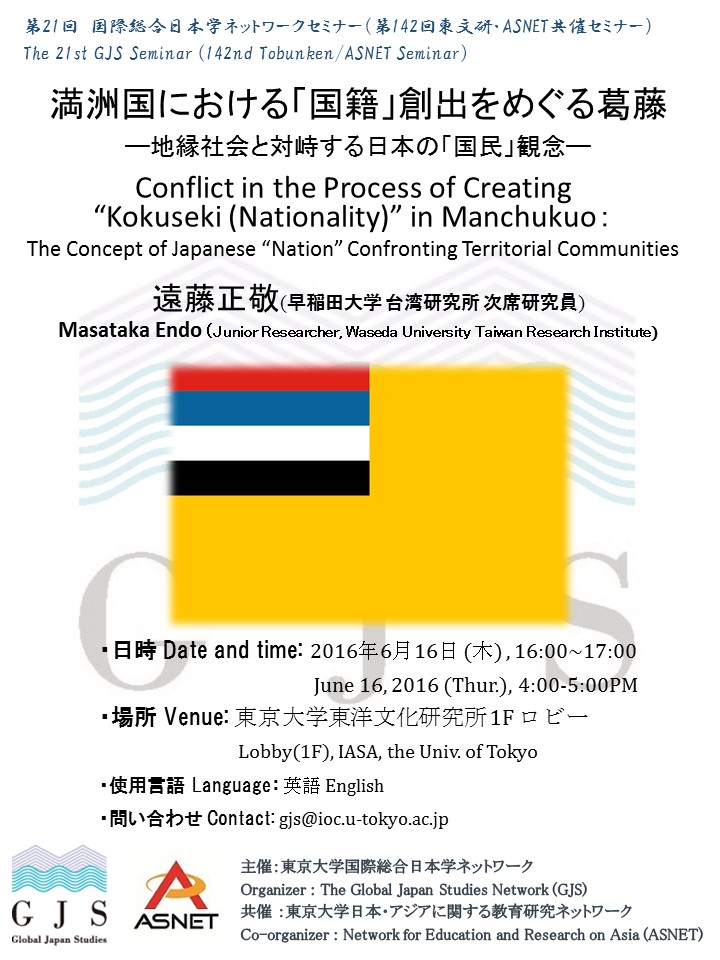The 21st GJS Seminar(142nd Tobunken/ASNET Seminar)Conflict in the Process of Creating“Kokuseki (Nationality)”in Manchukuo:The Concept of Japanese“Nation” Confronting Territorial Communities
| Date and time: | June 16, 2016 (Thur.), 4:00-5:00PM |
|---|---|
| Venue: | Lobby (1F), Institute for Advanced Studies on Asia, The University of Tokyo |
| Speaker: | Masataka Endo (Junior Researcher, Waseda University Taiwan Research Institute) |
| Language: | English |

Abstract: This report aims to clarify the concept of the nationality in Japan as a modern state , through examining the policy-making process regarding the legal construction of the nationality of “Manchukuo people” in Manchukuo as the transnational sphere.
The governance of Japan Empire had been penetrated by an unique family-state ideology, in which the State of Japan has been likened to “Ie(household)” ruled by an “unbroken line of Emperors” as the supreme “housekeeper”, and all nations entered it as “descendant” and assimilated. This ideology extended to the idea of “Hakko Ichiu” and had been exalted as “Kokutai (National polity)”which had been founded on the “Koseki” as the proof of the lineage tree of Japanese people.
The establishment of Manchukuo in 1932 appeared as a multiethnic state which Japan has never experienced. Manchukuo consisted of ethnically diverse populations such as Japanese, Han, Manchurian, Mongolian, Korean, what we call “Gozoku (Five Races)”, in addition White Russian and so on. Accordingly, the government of Manchukuo had to come up with the ideology of “inter-racial harmony (Minzoku Kyowa)". In the process of governing Manchukuo, the government of Japan needed to build a state based on the territorial society, not the blood society based on the homogeneous ideology which had been dominant in Japan for a long time. Consequently, how to make the legal system of the nationality and the Koseki in Manchukuo was the touchstone of ability of Japan to construct the multi-national coexistence society in which “Japanese Subject” also took part with other nations equally.
First, I will discuss about the process of drafting Manchukuo nationality law and the problems such as the classification of ethnicity and the confrontation between Jus soil and jus sanguinis. Especially, I will focus on the treatment of the nationality of Japanese in Manchukuo. How to treat the nationality of Japanese had link with the Koseki as the proof of “Japanese Subject”. Furthermore, how to treat the nationality of Korean had affected fundamentally Japan’s coronial rule over Korea. Second, I will deal with the national registration law in Manchukuo, which was enacted for the purpose of fostering the national identity as “Manchukuo People” in the inhabitants. These issues could not avoid compromising with and clashing with the idea of Minzoku Kyowa. How did the concept of “nation” in Japan face the contradictions in the process of creating the “Kokuseki (Nationality)” in Manchukuo which had a severe social cleavage from the beginning?
Co-organizer: Institute for Advanced Studies on Asia, Network for Education and Research on Asia (ASNET)
Contact: gjs[at]ioc.u-tokyo.ac.jp



